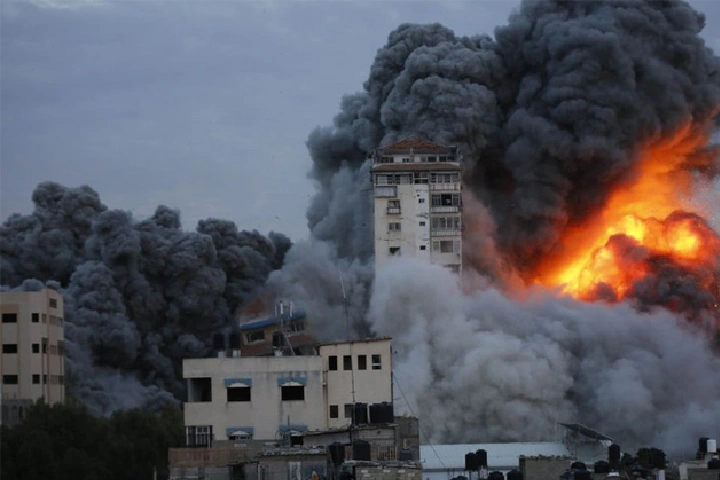Grandmaster of diplomacy Henry Kissinger shot to cult status as the greatest strategist negotiator after his role in bringing Israelis and Arabs to the dialogue table after the 1973 Yom Kippur War. Little do people know that Kissinger played deliberate “delayed diplomacy”. The ongoing Hamas-Israel war has echoes of Yom Kippur and the same “delayed diplomacy” plot being reenacted.
The recently published book Master of the Game: Henry Kissinger and the Art of Middle East Diplomacy written by Martin Indyk, former US ambassador to Israel and special envoy for the 2013 Israeli-Palestinian negotiations, provides insights into Kissinger’s diplomatic negotiations in the Middle East.
Kissinger had advised the US government not to help Israel in the 1973 war until the Egyptians crossed the Suez Canal and captured much of the Sinai Desert, in order to shock Tel Aviv and shake its concept of unassailability.
Consequently, the 1973 war increased Israel’s willingness to negotiate with its Arab neighbors. In 1979, Israel signed a peace treaty with Egypt, the first with an Arab country, which was later reflected in the Oslo Accords with the Palestinians.
BREAKING: World’s most famous war criminal, Henry Kissinger, still alive at 100 years old. pic.twitter.com/SPOqQjySSi
— Sydney Suxx(Thee/Thou)Ⓥ (@SydneySuxx) October 7, 2023
The October 7 Hamas raids into Israeli cities too is seen as a jolt to Israeli defence forces’ invincibility. However, there is no Kissinger on the scene and the Western powers led by the US so far are solidly behind Israel. They have thus far shown no willingness to mediate dialogue, not even for release of Israelis held hostage by Hamas.
The United Nations Security Council meeting ended without any statement. On Tuesday, UN chief Antonio Guterres called for a flow of humanitarian aid to Gaza after Israeli military blitzkrieg left total devastation in the blockaded strip along the sea.
He also said that he calls for an end to “the vicious circle of bloodshed, hatred and polarisation”.
UN Chief António Guterres says that while Israel’s security concerns are valid, their actions should adhere to international humanitarian law. He finds the reports of attacks on health facilities and homes in Gaza deeply concerning. Guterres also highlights that the decision to… pic.twitter.com/Wcrqx1pZdh
— Kulanthi Silva (@kulanthisilva) October 10, 2023
Besides, the European Union has announced that it will not suspend payment of development aid to Palestinians, reversing course after an earlier announcement that it would freeze all aid payments was met with widespread criticism.
But the EU aid is for the Palestinian Authority that controls the West Bank and parts of Jerusalem. The 296 million euros ($312m) in financial assistance from the EU will help cover expenses for the PA, such as infrastructure projects and civil servant salaries.
Arab and Muslim countries backing Palestinians have not been able to move any substantial diplomatic initiative. Iran has called for a united “ummah push”, but it hasn’t found any backing.
Arab League foreign ministers will meet on Wednesday to find “avenues of political action at the Arab and international level,” as Israel keeps pounding targets in Gaza.
Reuters reported on Monday that Qatari mediators held urgent calls to try to negotiate freedom for Israeli women and children seized by militants in Gaza in exchange for the release of 36 Palestinian women and children from Israel’s prisons.
An Israeli official however in a comment to The Times of Israel that “there is no negotiation” for the release of hostages.
Most influential Arab country Saudi Arabia, which was holding parleys with the Israeli government for normalisation only till last week, have also remained clueless about the diplomatic route that may end the mayhem in the Middle East where the public anger is expectedly mounting in favour of Palestinians.
AFP reported late on Tuesday that Saudi de facto ruler Crown Prince Mohammed Bin Salman held talks with Palestinian President Mahmoud Abbas and claimed that he was trying to prevent “an expansion” of the conflict.
Continuous engagement of MBS wid his ArabCounterparts strengthens hope tht peace will prevail in WAsia & it’ll put full stop on GenocidalAgenda of #Israel in #Gaza.
If he succeeds, history will remember him in kind words as of #KingFaisal for his brave role.#PalestineUnderAttack pic.twitter.com/VIEKhuV0Du— Navaid Hamid نوید حامد (@navaidhamid) October 10, 2023
Big powers like Russia and China too have eluded from taking active part and hurried up diplomacy to stop the conflict from festering further. Russia late on Tuesday offered to work with the Arab League to push for a solution.
“Russia and the Arab League, all members of this organisation, can and should contribute to solving problems, first of all, ending the bloodshed and suffering of civilians,” Russia’s Foreign Minister Sergey Lavrov said at his meeting with the Arab League Secretary-General Ahmed Aboul Gheit in Moscow.
Delayed or absent diplomacy has led West Asia commentators to predict more sinister scenarios which even can turn into wider regional catastrophe.
Mohammed Alhaya, a senior fellow at the Hudson Institute’s Center for Peace and Security in the Middle East, wrote in the Washington Post that the possible outcome of the current flare-up will have to tilt towards settling the question of Palestine.
“The latest Israeli-Hamas war makes abundantly clear that there can be no lasting peace in the Middle East without a regional solution to the long-running conflict between Israelis and Palestinians,” he wrote, adding that if the Israeli strikes continues in Gaza and diplomacy fails to prevent the onslaught, it will strengthen the position of Iran in the region.




















